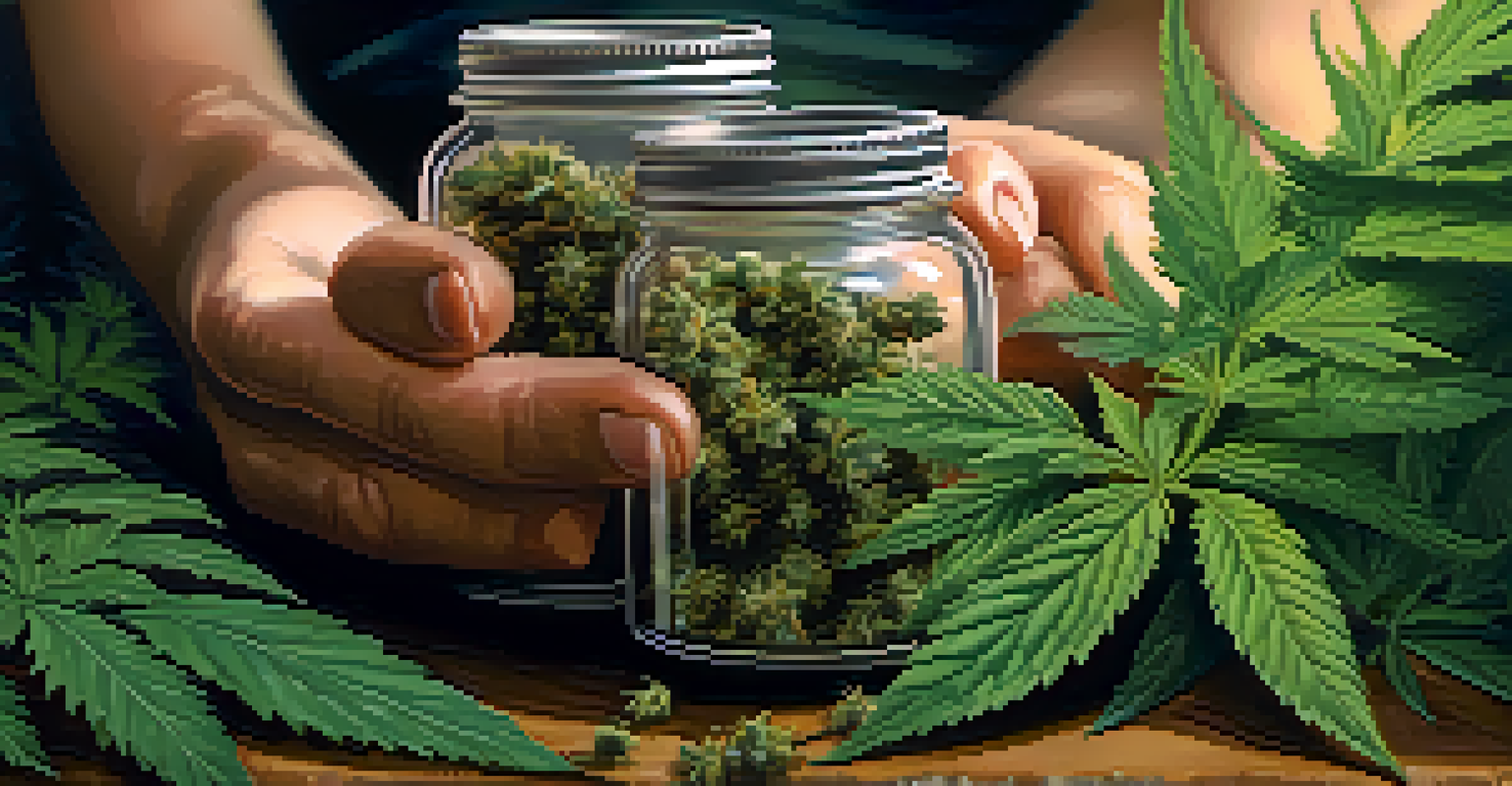Understanding Marijuana's Role in Addiction Recovery Strategies

The Basics of Addiction and Recovery
Addiction is a chronic condition that affects the brain's function and behavior, leading to compulsive substance use despite harmful consequences. Recovery involves various strategies that individuals can use to overcome addiction, which may include therapy, support groups, and sometimes, medication. Understanding these foundational concepts is crucial because they set the stage for exploring alternative approaches, including the use of marijuana.
Addiction is not a choice; it is a chronic disease that affects the brain's function and behavior.
Many people view addiction recovery as a journey rather than a destination, often requiring ongoing management and support. This perspective highlights the importance of finding tools that can help individuals navigate their recovery process. As societal views on marijuana shift, its potential role in this journey is increasingly being examined.
It's essential to recognize that recovery is not a one-size-fits-all experience. Each person’s path is unique, influenced by factors such as their history with addiction, personal circumstances, and available resources. This individuality makes it vital to explore diverse strategies, including both traditional and alternative methods.
How Marijuana Affects the Brain
To understand marijuana's role in addiction recovery, it's helpful to know how it interacts with the brain. Marijuana contains compounds called cannabinoids, which can influence neurotransmitters responsible for mood, pleasure, and pain perception. This interaction can lead to changes in the brain's reward system, which is often altered in individuals struggling with addiction.

For some, marijuana may provide relief from anxiety or cravings, potentially making it easier to cope during recovery. However, it's important to note that while marijuana can have therapeutic effects, it can also pose risks, especially for those with a history of substance use disorders. This duality makes it crucial to approach its use thoughtfully and with professional guidance.
Marijuana's Role in Recovery
Marijuana may help alleviate anxiety and cravings for some individuals in recovery, but its use should be approached thoughtfully.
Understanding these effects is like realizing how a tool can be both helpful and harmful depending on its application. Just as a hammer can build or destroy, marijuana's impact on recovery can vary greatly from person to person. This complexity calls for careful consideration and open discussion about its use in treatment.
The Benefits of Using Marijuana in Recovery
Many individuals in recovery have reported various benefits from using marijuana, including reduced anxiety, improved sleep, and lessened cravings for other substances. These effects can create a more manageable recovery experience, allowing individuals to focus on rebuilding their lives. For some, these benefits can act as a bridge to healthier coping mechanisms.
Recovery is about progress, not perfection.
Moreover, marijuana may serve as a substitute for more harmful substances, allowing individuals to reduce or eliminate their use of alcohol or opioids. This substitution can be a critical step in recovery, helping to break the cycle of addiction while providing a sense of relief. However, this approach should always be monitored by healthcare professionals to ensure safety.
Ultimately, the benefits of marijuana in recovery can be likened to finding a comfortable pair of shoes during a long journey. They can provide support and comfort, making the path ahead feel less daunting. However, it's essential to ensure that these 'shoes' fit well and are suitable for the journey.
Potential Risks of Marijuana Use in Recovery
Despite its potential benefits, using marijuana in recovery is not without risks. For some individuals, it can lead to a new dependency, especially if they have a history of substance abuse. This possibility highlights the importance of using marijuana carefully and under professional supervision.
Additionally, marijuana can have varying effects based on the strain and method of consumption. Some strains may induce anxiety or paranoia, which can be counterproductive for individuals trying to manage their mental health during recovery. Thus, understanding the nuances of marijuana use is key to minimizing potential downsides.
Personalization is Key
Each recovery journey is unique, necessitating tailored strategies that consider individual experiences and needs.
In this sense, navigating marijuana use in recovery is similar to walking a tightrope. While it can offer support, one misstep could lead to setbacks. This balancing act must be approached with caution and awareness of individual triggers and vulnerabilities.
Integrating Marijuana into a Recovery Plan
Integrating marijuana into a recovery plan requires careful consideration and should be done in collaboration with healthcare professionals. This process often begins with an open dialogue about the individual’s goals, concerns, and previous experiences with both addiction and marijuana. By establishing a clear understanding, a tailored approach can be developed.
It’s also vital to monitor the individual’s response to marijuana over time. Regular check-ins can help assess its impact on cravings, anxiety, and overall well-being, ensuring that it remains a supportive element in the recovery journey. This ongoing assessment can also help adjust the approach as needed, addressing any emerging concerns.
Think of this integration as crafting a recipe; each ingredient must be carefully measured to create a balanced dish. Similarly, marijuana can be one element among many, forming a comprehensive recovery strategy that works for the individual.
Personal Stories: Successes and Challenges
Listening to personal stories can provide invaluable insights into how marijuana has impacted individuals in recovery. Some have shared how it helped them cope with withdrawal symptoms or emotional distress, ultimately steering them toward a healthier lifestyle. These narratives often highlight the importance of finding what works best for each person on their unique recovery journey.
Conversely, there are also cautionary tales where reliance on marijuana led to new challenges, such as increased anxiety or a return to old habits. These stories remind us that recovery is not linear, and what works for one person may not work for another. They emphasize the need for individualized approaches and a strong support system.
Ongoing Research and Discussion
As societal views on marijuana evolve, ongoing research is essential to understand its benefits and risks in addiction recovery.
These real-life experiences serve as powerful reminders of the complexity of addiction recovery. Each story, whether positive or negative, contributes to the broader understanding of marijuana's role, helping to shape future discussions and strategies.
The Future of Marijuana in Addiction Recovery
As societal perceptions of marijuana continue to evolve, so too does the conversation around its role in addiction recovery. Research is ongoing, with studies examining the efficacy and safety of marijuana as a therapeutic tool in recovery settings. This research is critical as it can provide evidence-based guidance for healthcare providers and individuals alike.
Additionally, as more states legalize marijuana, access to different strains and forms of consumption is becoming more prevalent. This accessibility can facilitate discussions with healthcare providers about how marijuana might fit into personal recovery plans. However, it also underscores the importance of responsible use and education around potential risks.

Looking ahead, the future of marijuana in addiction recovery is likely to be shaped by ongoing research, personal narratives, and the evolving legal landscape. As we gain a clearer understanding of its benefits and challenges, more informed choices can be made, ultimately supporting individuals on their paths to recovery.